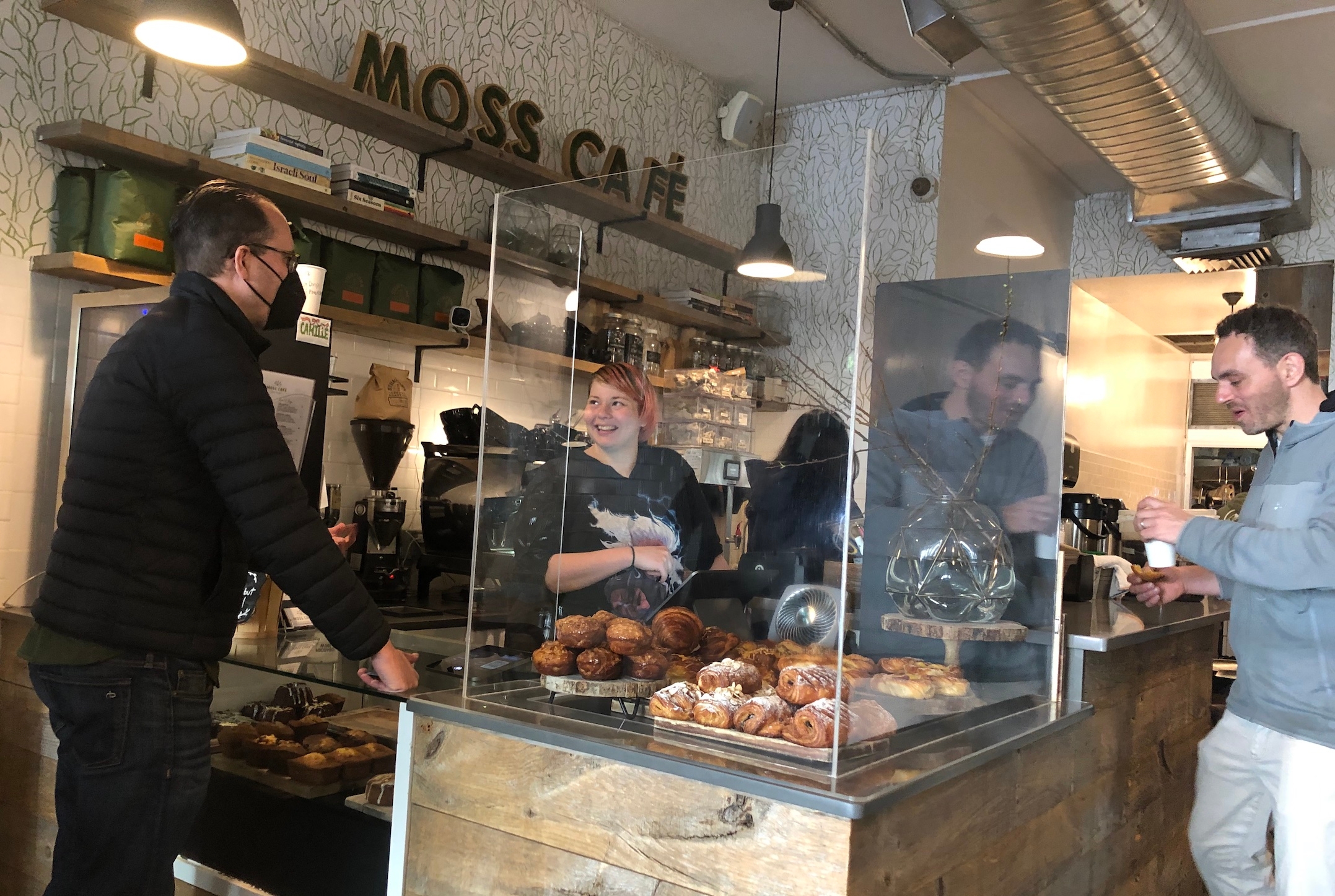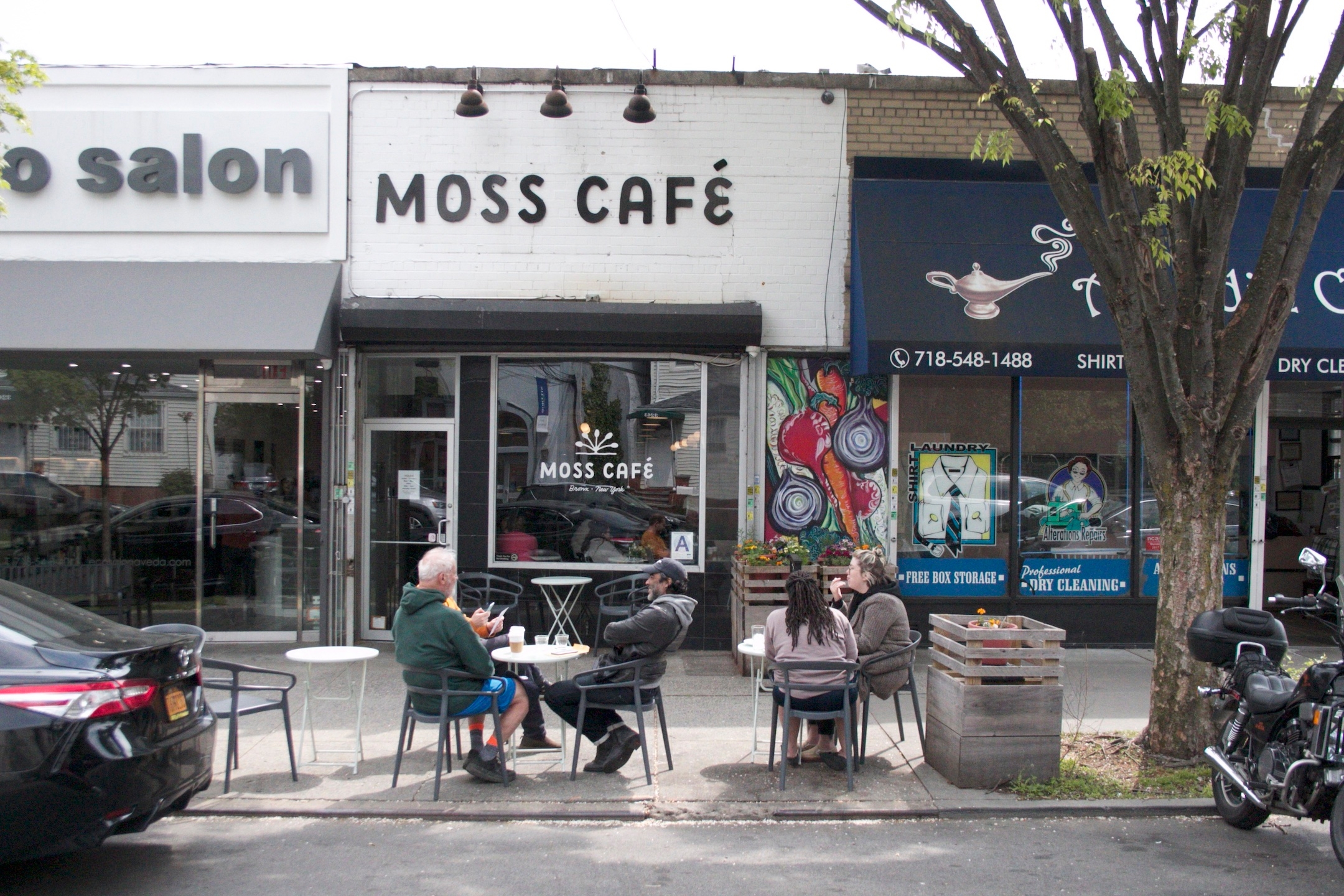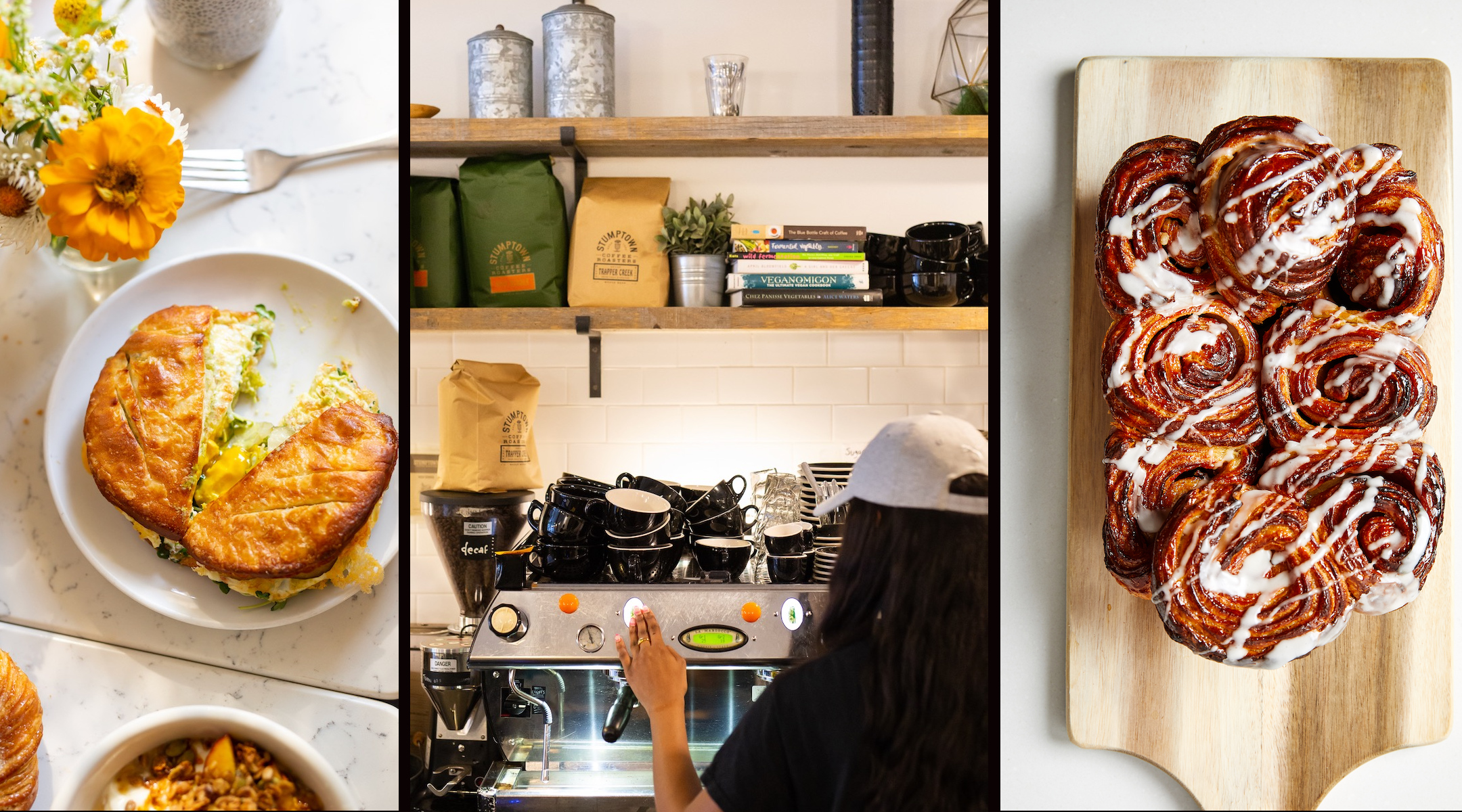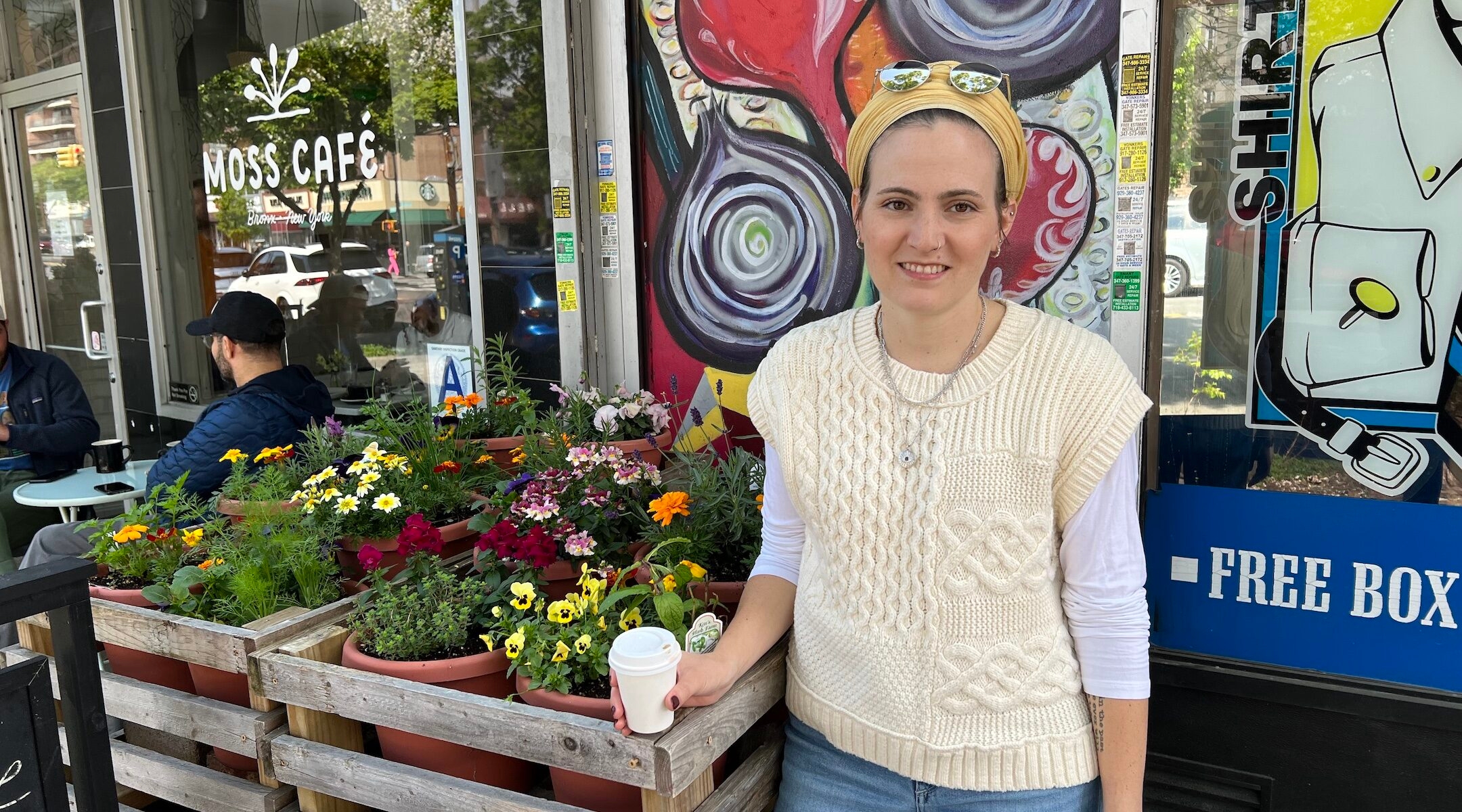(New York Jewish Week) — When Emily Weisberg arrived in the Bronx neighborhood of Riverdale in 2014, she was surprised that the coffee options didn’t extend far beyond Starbucks and Dunkin Donuts.
So she set out to create a cafe of her own, one that would not only serve up third-wave coffee but also function as a community hub outside of the relatively insular worlds of her kids’ daycare or her synagogue, the open Orthodox Hebrew Institute of Riverdale. She wanted a place where she could get to know everyone who lived in the neighborhood.
Nearly a decade later, Moss Cafe stands out the northern Bronx neighborhood — both because of its vivid mural of carrots, beets and red onions that pops on its otherwise drab block, and because of its unusual combination of seasonal foods, ethical practices and kosher supervision.
“Our clientele is really diverse, and I think that’s my greatest accomplishment here,” Weisberg told the New York Jewish Week. “We made a restaurant that everyone wants to come to that also happens to be kosher.”
Much of what a visitor to Moss encounters would not be out of place in any hip, upscale cafe. A selection of seasonal pastries, all baked in house, changes throughout the year; flowers in mason jars brighten every table. Moms with yoga mats tucked under their arms grab lattes to go and high schoolers cluster around the window seat with their laptops. The shakshuka is fragrant with garlic and za’atar, and chef Brian Engel’s kale salad, enriched with parmesan and pepitas and studded with roasted beets, is as good as any in the city. The restaurant recently added dinner service, with a menu including a “picky plate” designed to accommodate families.
At the same time, the cafe is strictly kosher — it serves fish and dairy, but not meat, under the supervision of the Vaad of Riverdale — and closes on Shabbat. Its bakery case includes fluffy challahs on Friday mornings, and special catering menus feature traditional foods for Jewish holidays. Customers can often be overheard discussing Jewish texts, the neighborhood’s multiple day schools and upcoming trips to Israel.
On a recent breezy April day — the first spring morning that rhubarb appeared in the cafe’s farm deliveries — Moss was jammed with neighborhood regulars and visitors from all walks of life. Samuel Marder, a nonagenarian violinist and Holocaust survivor — whose wife, the pianist Sonia Vargas, was Riverdale native Regina Spektor’s music teacher — sat at a table adjacent to Sage Vasquez and Diamond Wynn, two culinary professionals from the South Bronx. It was their first visit, but they discovered that a friend worked at Moss and felt at home.

Moss’ pastry counter is always filled with seasonal items. (Ben Resnick)
“I see a lot of people who look like me, and that’s important when I go out to eat,” says Vasquez, a pastry chef. “The neighborhood is like a breath of fresh air from the South Bronx.”
Moss also stands out for its commitment to mutual aid in the borough. Case in point: Few other independent neighborhood coffee shops employ a dedicated director of community outreach. Tess Watts, who has that role at Moss, started at the cafe as a server while she was a student at nearby Manhattan College. Now, she leads Moss’s collaborations with neighborhood nonprofits such as the Riverdale Community House.
Last year, the cafe donated nearly $11,000 of its revenue to local nonprofits and charities, and raised an additional $2,900 for those groups. It also donated more than $7,400 worth of excess food to local community fridges, putting food directly into the hands of those who needed it. Watts says as a community-oriented cafe located in a well-to-do enclave in New York’s poorest borough, Moss has a responsibility to help its neighbors, not just its customers.
“If your mission is to build community around food, you can’t discount the ways that the community is impacted by food,” she said. “You have to look at food insecurity, you have to look at economic inequality. In order to operate a restaurant and call ourselves ethical, we have to do it.”

Moss Cafe sits on a nondescript block in the commercial heart of Riverdale in New York City. (Ike Allen)
Moss has stuck with that commitment since it opened in 2015. Weisberg, the co-owner and face of the cafe, was raised in the rural Midwest, where she got a job at 16 in a small-town coffee shop. That cafe — Perc Place in Hartford, Wisconsin — gave her a lasting appreciation for the communal spaces that coffee shops can provide. Even in a small heartland town like hers, many of the cafe’s workers were immigrants from Latin America, and people from all walks of life chatted together at the tables over cups brewed from beans grown in the highlands of Guatemala and Colombia.
“Living in a place that was not very diverse, I always longed for that,” Weisberg said. “This was a special way to connect with where I was and also to open up my world, through food and coffee and through my coworkers.”
Weisberg lived for a time in Peru and took classes in Latin American Studies at the University of Wisconsin, intending to eventually practice immigration law. While living in Madison, Wisconsin, she worked at restaurants and frequented the local farmers market where, she said, “local food was a thing before it was on a national scale.”
At the same time, her spiritual interests steered her toward Judaism — she was raised Catholic — and she converted at 21, after studying with a campus Chabad rabbi and rebbetzin. In Madison, she also met Alex Weisberg, who had been raised by a secular Jewish family in New York’s Westchester County but became more interested in religion after a Birthright trip.
The two got married in Jerusalem and lived there for three years, where Weisberg opened a coffee and pastry window from their home, where customers would sit on chairs set up on the cobblestone street.
That was the experience she hoped to recreate in Riverdale after they moved to New York City in 2014 — Weisberg felt she could help her community as a good employer. The ethical mission of Moss, she said, starts with pay and conditions for its own employees.

Snapshots of Moss Cafe’s menu and interior. (Courtesy of Moss Cafe)
“These people are the heart and soul of our neighborhoods,” she said. “It’s true that I opened Moss, but Moss is really the people who are, day in and day out, showing up at 4 in the morning to bake things, or scrubbing tables at 4 p.m. on a Friday.”
But Moss also stays afloat because its entire team is committed to the ethical mission of the cafe, including its close relationships with small New York and Pennsylvania farms — during the early days of the pandemic, Weisberg helped support farms and her own business by selling produce boxes from the cafe — and postpartum meals for new mothers through the Bronx doula groups the Birthing Place and Ashe Birthing Services.
With a large and growing Orthodox community in Riverdale, it was important to Weisberg for Moss Cafe to be strictly kosher. But while the certification allows some diners who wouldn’t otherwise be able to eat there, not all customers come looking for a kosher dining experience.
“I grew up Jewish and all the Passover and kosher food can be very bland,” said Brian Silbert, a former Manhattanite who plans to open an ice cream shop nearby. “This is savory and flavorful without it suffering. Across the board, everything is done right.”
The New York Jewish Week brings you the stories behind the headlines, keeping you connected to Jewish life in New York. Help sustain the reporting you trust by donating today.





